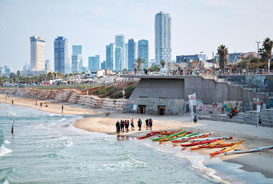When you're collaborating with Israeli partners or working in teams across Israel and beyond, some of the biggest obstacles come from assumptions you didn’t even know you were making.
It’s not enough to rely on surface‑level knowledge or generic cultural checklists. Success depends on reading the unspoken signals — how directness, initiative, and informality influence relationships, decisions, and trust.

Start by asking the right questions:
The questions below offer a window into what really matters — and where Cultural Savvy can help you uncover the invisible, decode the subtle, and move forward with confidence.
💬 Communication & Speed
- How do Israelis interpret direct feedback — and when can it be mistaken for confrontation?
- What does “fast response” really mean — in Israel vs. other countries you work in?
- How do informal tone and casual interactions affect expectations in meetings or negotiations?
🎯 Authority & Initiative
- Who owns decisions in organizations where hierarchy feels flatter?
- How do people respond when asked to act independently vs. seeking consensus?
- What signals or behaviors indicate that you can push for initiative without causing discomfort?
🤝 Trust & Relationship Dynamics
- What matters more — initial credentials or personal reputation — when starting a relationship?
- How important is informal networking (coffee meetings, social interactions) in sealing trust?
- What unspoken expectations exist around loyalty, commitment, or long‑term partnership?
🌐 Global Collaboration & Expectations
- How do Israeli working styles (e.g. speed, directness) contrast with what your team is used to?
- What assumptions might Western or Asian colleagues make about process, hierarchy, or decision clarity that don’t hold in Israel?
- How can remote or cross‑border teams avoid misunderstandings related to pace, feedback, or responsibility delegation?
⚠️ Risk, Strategy & Market Perception
- How is risk perceived differently when failure is more accepted vs. when it’s penalized?
- When entering Israeli markets or partnering with Israeli companies, which cultural assumptions could lead to misalignment?
- What role does innovation culture play — and how does that influence leadership expectations or resource allocation?
The Answers Are in the Culture
The questions above reveal more than just preferences — they uncover deeply held cultural values that shape how Israelis work, communicate, and lead. In Israel, speed, innovation, and improvisation are prized — but so are fierce debate, high tolerance for ambiguity, and a bias for direct action.
Underlying these behaviors are values like chutzpah, bitzuism (getting things done), informality, military-influenced leadership, and an emphasis on adaptability over structure. These cultural traits often surprise international teams who expect linear planning or rigid hierarchy.
At Cultural Savvy, we help you understand and leverage these unique dynamics. Our training and coaching solutions equip you to lead effectively, communicate clearly, and avoid missteps — whether you're collaborating with Israeli startups, R&D teams, or global partners in Tel Aviv, New York, or anywhere in between.
Contact us today to explore how our training and coaching solutions can equip your team to succeed — whether you're tackling global initiatives or navigating complex cross-cultural challenges. We welcome the opportunity to support your goals — across cultures, across borders, and across the global landscape.
HOME | SERVICES | CULTURAL INTELLIGENCE | EXPLORE CULTURES | INSIGHTS | ABOUT | CONTACT
Email Us | www.culturalsavvy.com | ©1999–2025 Cultural Savvy. All Rights Reserved. Terms of Use
